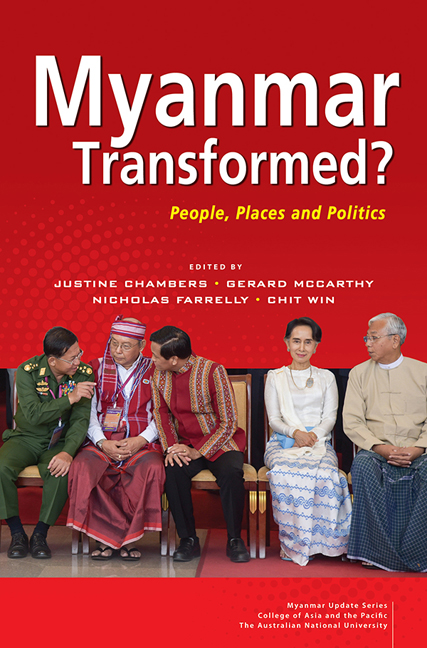Book contents
- Frontmatter
- Contents
- List of Tables
- List of Figuress
- Acknowledgements
- Contributors and Editors
- Part I Introduction
- Part II People
- Part III Places
- 5 Myanmar's Rural Revolution: Mechanization and Structural Transformation
- 6 Change and Continuity: Capacity, Coordination and Natural Resources in Myanmar's Periphery
- 7 Advocacy Organizations and Special Economic Zones in Myanmar
- 8 Explaining Naypyitaw under the National League for Democracy
- Part IV Politics
- Part V Epilogue
- Abbreviations and Key Terms
- Index
7 - Advocacy Organizations and Special Economic Zones in Myanmar
from Part III - Places
Published online by Cambridge University Press: 12 February 2019
- Frontmatter
- Contents
- List of Tables
- List of Figuress
- Acknowledgements
- Contributors and Editors
- Part I Introduction
- Part II People
- Part III Places
- 5 Myanmar's Rural Revolution: Mechanization and Structural Transformation
- 6 Change and Continuity: Capacity, Coordination and Natural Resources in Myanmar's Periphery
- 7 Advocacy Organizations and Special Economic Zones in Myanmar
- 8 Explaining Naypyitaw under the National League for Democracy
- Part IV Politics
- Part V Epilogue
- Abbreviations and Key Terms
- Index
Summary
The Myanmar government announced in January 2012 that, due to environmental concerns, they had cancelled plans for the construction of a coal-fired power plant in Dawei, in the south of the country. The proposed power plant was to produce 4,000 MW, making it one of the largest coal-fired power plants in the region. It was also part of larger plans for a deep-sea port and Special Economic Zone (SEZ) in Dawei—a project led by Thailand's largest building contractor, Italian-Thai Development. In the lead-up to the cancellation of the coal-fired power plant, there had been significant mobilization of local citizens in Dawei in opposition to it, involving distribution of information about the power plant, use of local media, and protests. Local activist groups had also established transnational links including with advocacy organizations in Thailand and in Europe.
This incident, which was early in the period of the Thein Sein government, highlighted the unique place of Special Economic Zones at the intersection between, on one hand, economic liberalization, and on the other hand, political liberalization in Myanmar. The shift away from authoritarian military governance to the Union Solidarity and Development Party (USDP) government under U Thein Sein, and then to the National League for Democracy (NLD) government after the 2015 elections, facilitated increased flows of investment into development projects such as the planned Dawei development project. Yet on the other hand, the end of direct rule by the State Peace and Development Council (SPDC) also ushered in greater freedoms and opportunities for citizens to network, mobilize and oppose development projects when the projects diverged from their hopes or visions.
The SPDC government under General Than Shwe sought to control citizens and local organizations largely through coercion and the threat of crackdown. The operation of social or political organizations during these periods thus depended often on avoidance of, rather than engagement with, the state (Fink 2001). This legacy of military rule remains, to some degree, in the relations between communities, government and companies in SEZs. Yet there have also been striking changes since 2011 in the forms of contentious politics in Myanmar. Many advocacy organizations are seeking to engage the state and businesses through formal institutions and through forging new direct relationships with policymakers.
- Type
- Chapter
- Information
- Myanmar Transformed?People, Places and Politics, pp. 161 - 180Publisher: ISEAS–Yusof Ishak InstitutePrint publication year: 2018



